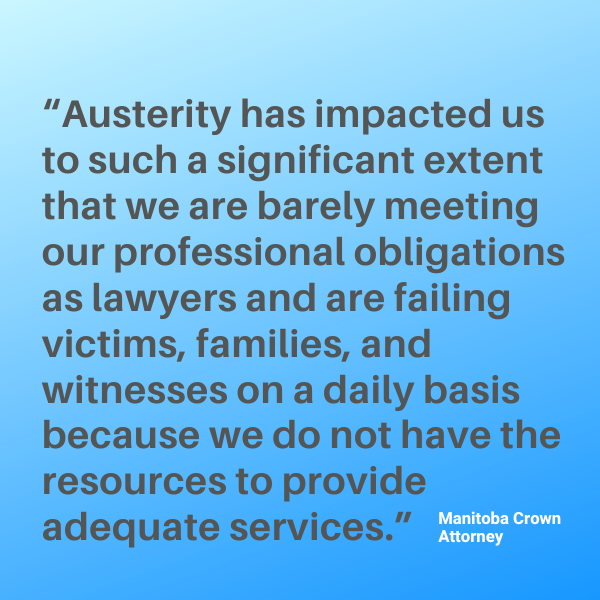
By Elizabeth Comack and Amelia Curran
Previously published in the Winnipeg Free Press on July 5, 2023
As the Winnipeg Free Press reported on June 27, 2023, the Manitoba government has recently earmarked $3.4 million to add 19 Crown prosecutors and six additional staff to Prosecution Services. The move marks the single largest increase to Manitoba Prosecution Services in 15 years.
Justice Minister Goertzen attributed the demand for more staff to pressures to get cases to trial within required time frames and a rise in violent crime and arrests. But there is another story behind this announcement.
Since coming to power in 2016, the Conservatives have been bent on implementing austerity measures designed to reduce expenditures and shrink the public service. Community supports — healthcare, housing, social services — have suffered under these cuts, creating the conditions for rising crime rates.
Indeed, 95 percent of the 182 Justice workers who participated in a survey examining provincial government austerity noted that their work has been negatively impacted by the government’s austerity measures; 75 percent of respondents also believed that expenditure cuts and restraints have worsened public safety.
Manitoba Justice Annual Reports show that vacancies and underfilled positions “saved” $2.4 million, $2.5 million, and $2.8 million in Prosecution Service staffing costs in 2016/17, 2017/18, and 2018/19. But those cuts came at the expense of staff wellbeing and those they serve.
According to Crown attorneys surveyed, understaffing was resulting in staff burnout and low morale in the Crown’s Office. One worker commented, “Austerity has impacted us to such a significant extent that we are barely meeting our professional obligations as lawyers and are failing victims, families, and witnesses on a daily basis because we do not have the resources to provide adequate services.”
Workers also believed that vacancies occurred because of low salaries paid to Crown attorneys. One commented, “We are losing experienced Crowns to the private sector and other jurisdictions, where they are appropriately compensated.” Several workers described the Crown’s Office to be “in crisis” as a result.
Prosecution Services is not the only Justice branch affected by these austerity measures. In Community Corrections, which is responsible for the supervision of adult and youth offenders in the community and funding community agencies to carry out their programs, over $2 million was saved due to vacant or under-fill positions in 2017/18. Another $277,000 was left unspent due to “operational efficiencies and expenditure management,” while $355,000 was reduced for programs and external agencies. Similar reductions occurred in the ensuing four years.
As one worker noted, “Reducing Probation Officers (or not filling vacant positions) reduces public safety and puts additional strain on police, health care, EIA, etc.” Another remarked, “Increasing funding for access to basic needs like housing for clients would significantly impact recidivism rates and increase public safety overall.”
Custody Corrections, which manages adult offenders sentenced to less than two years and remanded adults, as well as youth held in custody, has experienced similar shortfalls. At February 28, 2021, 27 percent of the positions in Custody Corrections were vacant.
According to workers, staff shortages in Custody Corrections produced an “overtime crisis” and heightened safety issues in correctional facilities. One worker noted, “Reduced staffing leads to overworked and overtired staff that are unable to proactively stop the violence that occurs in our jails.” Workers also commented on the precarious nature of their employment: “All staff hired as correctional officers are part time however expected to work as many hours as are available, which has typically been full time or more.”
Increased workloads and precarious work have taken their toll on correctional staff. Cutting prison programs that provided training opportunities for inmates and closing the Dauphin Correctional Centre and Agassiz Youth Centre created added strain in the system.
These austerity measures undermine the key mission of Manitoba Justice: “to support and promote safe and just communities for all Manitobans.” Safe and just communities are not achieved through austerity.
Public safety requires government investment, resources, and support. Reliance on incarceration is reduced only when community supports are robustly available. Rather than quick fixes that have little social and financial value over time, the focus should be on the long-term cost savings that come with crime reduction. Increasing the budget to Prosecution Services may alleviate some pressures on staff, but it does not address the negative effects that austerity measures have had on crime rates more broadly.
Primarily, cost cutting impedes the government’s ability to address the social inequalities at the root of crime — the main thing the Manitoba government should be focused on.
Elizabeth Comack is a distinguished professor emerita in Sociology and Criminology at the University of Manitoba. Amelia Curran is an Instructor in the Criminal Justice Department at the University of Winnipeg. They co-lead the justice, safety, and security stream of the Manitoba Research Alliance, hosted by the Canadian Centre for Policy Alternatives – Manitoba.


